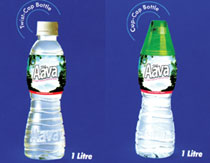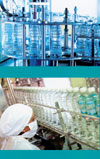|
|
|
You can get e-magazine links on WhatsApp. Click here
|
|
|
|
|
|
Aava is the first natural mineral water in western India
|
|
Saturday, 15 April, 2006, 08 : 00 AM [IST]
|
|
Bosky Christopher, Mumbai
|
It wasn't that long ago when the only water one knew about came from either the tap or the sky. Nowadays there's a brand for almost every day of the week.
Just when you thought the market couldn't get any more saturated, there's a new addition to the bottled water market, Aava. Veeraal Mehta, CEO of Trader's Inn, is very excited about Aava. It is naturally pure and does not need to be put through any chemical processes, UV radiation or Reverse Osmosis. It has a natural mineral composition that is beneficial to health and is absolutely safe to drink.
Traders Inn are the distributors of Aava bottled by Behram Mehta of Ahmedabad-based Sheelpe Enterprises.
Mehta's biggest boast about the product, besides being completely natural, is the fact that for the first time in India, Aava offers a fully automatic, washable, hygienic and air-conditioned water plant, untouched by human hands at all points. Mehta says there are benefits to the water even down to the unique shape of the bottle. Aava is available in four different sizes. Cup-Cap Bottle (one litre bottle with a unique cup for drinking), Sports Bottle (750 ml bottle with unique "pull-push cap"), Aava Mini (200/300 ml bottle that's easy to carry), and Family Pack (20 litre pack with spill-proof cap for home or office use).
Dubbed the best among equals, Mehta said the product would be sold in the innovative packaging of cup-cap and sports-cap that allows the consumer to avoid human contact with the mouth of the bottle. "Aava is women and children-friendly. It is a well-known fact that women don't like to drink straight from the bottle therefore the unique cup-cap is a great companion while on the move."
Mehta said Aava is trying to make locals aware of what exactly is healthy water. "The absolutely well balanced natural minerals help avoid intravascular and cardiac diseases, good for skin, teeth, muscles, bones, and nervous system, osteoporosis, arthritis and cataract."
With an obvious reference to market leader in natural mineral water, Himalayan, he expressed dismay at how they did not do adequate to educate the Indian masses.
He said, "Packaged drinking water is poison. These MNCs are doing so much wrong. Do they care about society or are they only worried about financial gains? What we are drinking now is rubbish. I'm sorry to say that."
"Aava tastes natural unlike the bitterness of water processed through Reverse Osmosis. For every litre of water that is processed through Reverse Osmosis, two litres of water is wasted," said Mehta.
Besides, packaged drinking water (Aquafina, Kinley, Bisleri, Bailey, Kingfisher, Oxyrich, etc) is treated through chemicals, UV rays, etc.
Chlorine and fluorides are mainly found in municipal tap water which is used for most of the packaged drinking water. According to the US Council of Environment Quality, "Cancer risk among people drinking chlorinated water is 93% higher than among those whose water does not contain chlorine."
Across the world the latest research shows that the fluorides in the water are extremely dangerous and poisonous for the human body. At present the maximum permissible limit is 1.0 as far the world standard but there is a strong recommendation across the world that permissible limit for fluorides in the water should be anywhere between 0 to 0.5.
"Fluorides in Himalayan are 0.90 while Aava contains 0.2 which clearly shows that Aava is safer, especially for children," said Mehta.
The CEO did not hide the fact that his offering would be of a slightly higher price. This was a small sacrifice, he said, considering health benefits.
"Aava will cost about Rs 20. For just a bit more, wouldn't you go for the healthier water? I had an argument with someone recently. He would pay for the best whisky but would not pay that extra for a bottle of water that is actually better for you." In this backdrop, Aava is all set to initiate the 'Penny wise, Pound foolish' campaign.
"Aava is an aquifer water (underground spring) which is completely protected from natural and as well as human contamination. It goes through 77 different tests before being bottled to ensure that it is free from harmful chemicals or microbiological organisms," added Mehta.
With an aim to give back to nature what it takes from it, Aava has contributed to the State Government of Gujarat towards the construction of a check-dam in a tribal area.
With its presence in South Mumbai at Cricket Club of India, Wellington Club, Breach Candy Club, restaurants like Mocha, Khyber, Henry Thames, and Monza, premium theatres like Sterling and Regal, Aava is now moving to Bandra. It was also recently associated with sports events like Davis Cup and is set to intensify its print and electronic campaign.
The bottled water industry in India is estimated at about Rs 1,000 crore and is growing at 40 per cent. "By 2010, it will reach Rs 4,000 - 5,000 crore with 33 per cent market for natural mineral water. Aava bottling plant now produces 20,000 litres a day but has the capacity to produce 1 lakh litres a day," concluded Mehta.
 
Quality of bottled water difficult to monitor
The differences between natural mineral water and packaged drinking water are hard to determine. Improving consumer awareness would perhaps guide the public when making water purchases. Water is on the list of 109-odd products for which ISI certification is a must. The Bureau of Indian Standards (BIS) recently unearthed several cases of water being sold in containers using fake ISI labels in the city.
A couple of years ago, consumer activists who questioned the various practices of water marketers and sellers were shocked to find that there is no standard for pure and/or drinking water in the various Acts which are supposed to protect consumer interests. The closest Act available was the Prevention of Food Adulteration Act, but neither in this nor in any other Act was water defined as food. It was discovered that none of the laws have laid down any standards for drinking water, the levels of various salts and chemicals therein, and even a definition for 'mineral water'.
A writ petition was filed in the Bombay High Court pointing out this anomaly. The High Court asked the state government to lay down standards for various products available in the market described as drinking water. The state government is taking several hesitant steps in this direction and even today there is no clear policy on the subject. The writ petition is still in the High Court.
|
|
|
|
|
|
|
|


|
|